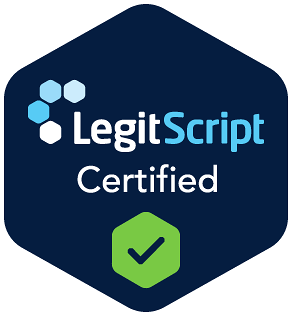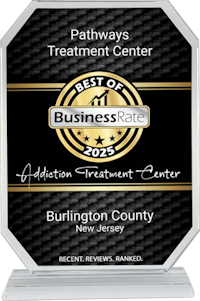ADHD and Addiction Treatment in Burlington, New Jersey
For individuals with ADHD and addiction, recovery involves building focus, structure, and self-regulation. Our specialized dual diagnosis treatment addresses both conditions to promote stability and success in sobriety.
Navigating the challenges of a dual diagnosis can be overwhelming. These conditions often feed off each other, making daily functioning difficult and leading to a cycle that can be hard to break.
For individuals with ADHD, the temptation to self-medicate with drugs or alcohol can be strong, but this often evolves into a complicated situation requiring professional intervention. But there is hope, and there’s much that can be done about suffering addiction with ADHD.
Dual Diagnosis Treatment
What is ADHD?
ADHD, or Attention-Deficit/Hyperactivity Disorder, is a neurodevelopmental disorder that includes patterns of inattention, problems with self-regulation, and impulsivity, which can interfere with daily functioning or development. Usually diagnosed in childhood, ADHD continues into adulthood and can vary in severity. Although the exact cause of ADHD is unknown, it is believed to result from a combination of genetic, environmental, and neurological factors.
A healthcare professional can typically diagnose ADHD through a comprehensive evaluation. This process may include a medical exam, a review of medical history, and information gathering from parents, teachers, and others. ADHD can impact various life areas, including academic performance, work, relationships, and self-esteem. However, with proper treatment and support, individuals with ADHD can lead successful and fulfilling lives.

Dual Diagnosis Treatment
The Connection Between ADHD and Substance Abuse
Individuals with ADHD (Attention Deficit Hyperactivity Disorder) are at a significantly higher risk of developing substance abuse disorders, and this increased risk can be linked to several factors. People with ADHD often exhibit impulsivity and engage in risk-taking behaviors, which can lead them to experiment with drugs and alcohol earlier and more dangerously.
Many people with ADHD use substances as a form of self-medication to manage symptoms (like hyperactivity, inattention, and restlessness), which can quickly lead to dependency and addiction. The daily challenges of managing ADHD, such as difficulties in focusing, organizing tasks, and controlling impulses, can also contribute to stress and frustration. This can push some to seek temporary relief through substance use.
Genetics and environmental factors play a role too. A family history of ADHD or substance abuse can increase the likelihood of developing both. Environmental stressors like trauma or chronic stress can make things harder. Diagnosing and treating someone with both ADHD and substance abuse issues can be tricky, as the symptoms of one can mask or mimic the other. Individuals with both conditions usually face more severe symptoms and challenges. That’s why dual diagnosis treatment is so important—it helps address both drug addiction and ADHD simultaneously, leading to better outcomes and a healthier, more fulfilling life.
What are the Common Substances Abused by Individuals with ADHD?
Navigating the link between ADHD and substance abuse can be complex, but it’s essential to understand why individuals with ADHD might turn to substances to cope. While this might seem helpful initially, it often leads to a cycle of dependency and further complications.
Here are some common substances used by individuals with ADHD:
Many people with ADHD smoke or vape because nicotine can temporarily enhance focus and reduce impulsivity. However, it’s highly addictive and poses serious health risks.
Alcohol is frequently used to calm down and manage anxiety. While alcohol may seem beneficial at first, it can actually worsen ADHD symptoms and lead to alcohol dependence.
Often used to relax or reduce hyperactivity, marijuana can temporarily impair cognitive function and motivation (which are already challenging for those with ADHD). For some, it may also be detrimental to memory.
Sometimes, individuals with ADHD misuse their prescribed stimulant medications by taking higher doses or using them in non-prescribed ways to enhance focus and energy. This can be dangerous and lead to prescription drug addiction.
Understanding the reasons behind drug addiction and ADHD is crucial for providing the right support and treatment. At Pathways Treatment, we recognize the unique challenges faced by individuals with ADHD and substance abuse issues. Our comprehensive addiction treatment programs are designed to address both conditions simultaneously, ensuring a holistic approach to recovery.
What are the Risk Factors for Substance Abuse in People with ADHD?
Individuals with ADHD face various risk factors that may increase their susceptibility to substance abuse. These factors include:
Both ADHD and substance abuse have strong genetic components, and a family history can increase susceptibility. Genetic variations affecting neurotransmitter systems like dopamine make it harder to resist addictive behaviors.
Depression, anxiety, and other mental health disorders often co-occur with ADHD. These conditions can lead to self-medication with substances, creating a cycle of addiction. Behavioral disorders like oppositional defiant disorder (ODD) and conduct disorder (CD) also contribute to substance use through associated defiant and aggressive behaviors.
Growing up in a household with substance abuse, lack of parental supervision, inconsistent discipline, family conflicts, and socioeconomic stressors heightens the risk of substance abuse. Adolescents and young adults with ADHD are especially vulnerable to peer influence and may experiment with substances to gain acceptance.
ADHD-related impulsivity leads to spontaneous decisions without considering consequences, increasing the likelihood of trying substances. The search for novel and stimulating experiences makes drugs and alcohol appealing due to their quick and intense effects.
Poorly managed ADHD symptoms significantly increase the risk of substance abuse. Without proper treatment, individuals may use substances to cope and fall into dependency. Ineffective treatment and misuse of prescribed medications further exacerbate the risk of substance abuse.
Dual Diagnostic Treatment
What are the Signs and Symptoms of Substance Abuse in Individuals with ADHD?
Recognizing substance abuse in individuals with ADHD can be challenging. Here are some of the most reliable 10 signs and symptoms of substance abuse in individuals with ADHD to look for:
- Impulsivity: Increased impulsive behaviors, such as making hasty decisions without considering consequences.
- Disorganization: Heightened levels of disorganization in daily activities, work, or school performance.
- Risk-Taking: Engaging in more risky behaviors than usual, such as driving recklessly or unsafe sexual practices.
- Changes in Social Circle: Associating with a new group of friends, especially those known to use substances.
- Neglecting Responsibilities: Ignoring or neglecting responsibilities at home, work, or school.
- Changes in Appearance: Noticeable changes in personal hygiene or physical appearance.
- Mood Swings: Severe and frequent mood swings.
- Anxiety and Depression: Increased symptoms of anxiety or depression.
- Tolerance and Withdrawal: Developing tolerance (needing more of the substance to achieve the same effect) or experiencing withdrawal symptoms.
- Isolation: Withdrawing from family and friends.
If you suspect that someone with ADHD is struggling with substance abuse, it’s crucial to approach the situation with empathy and support. Professional help from a mental health provider or addiction specialist can be vital in addressing both ADHD and substance abuse.
Dual Diagnostic Treatment
The Impact of Substance Abuse on ADHD Treatment
Substance abuse complicates ADHD treatment, by worsening ADHD symptoms and sometimes reducing the effectiveness of medications. Stimulants used for ADHD can become less effective or even dangerous when mixed with alcohol or drugs, making it harder for individuals to focus and control impulses. Additionally, substance abuse can cause further health problems, such as liver damage and mental health issues, complicating ADHD management.
Treating drug addiction and ADHD together is essential for better outcomes. Integrated approaches combining medication, behavioral therapy, and substance abuse counseling are vital. Addressing both conditions simultaneously allows for more effective, personalized care, improving overall health and quality of life. Early intervention is crucial to prevent substance abuse from undermining ADHD treatment.
What are the Effective Treatment Approaches for Co-occurring ADHD and Substance Abuse?
Treating co-occurring ADHD and substance abuse requires an integrated approach that addresses both conditions. Effective treatment strategies may include:
Medical detoxification is crucial for individuals with substance abuse histories, especially those with ADHD. This process involves safely managing withdrawal symptoms and cleansing the body of harmful substances. Medical supervision and supportive care are essential to ensure a safe and effective detox, paving the way for further treatment and recovery.
Cognitive behavioral therapy (CBT) helps individuals develop coping strategies, manage ADHD symptoms, and reduce substance use. Contingency management and motivational interviewing are also effective in promoting behavior change and treatment adherence.
Peer support and group therapy provide a platform for sharing experiences and strategies. These sessions foster a sense of community and offer a supportive environment to discuss challenges and solutions.
Healthy habits like regular exercise, a balanced diet, and adequate sleep positively impact both ADHD symptoms and substance use. Consistent daily routines help manage time and reduce impulsivity.
Family therapy and education enhance support for individuals with ADHD and substance abuse. Involving family members improves communication, understanding, and empathy, which are crucial for long-term recovery.
These combined efforts can help individuals manage their ADHD symptoms and reduce the risk of substance abuse, leading to better overall health and well-being.
Break the Cycle with Comprehensive ADHD and Substance Abuse Treatment in New Jersey
If you or a loved one is dealing with both ADHD and addiction, we’re here to help. At Pathways Treatment, we get how these challenges can be intertwined and offer treatment plans designed just for you. Our holistic approach addresses both ADHD and substance abuse, paving the way for lasting recovery and a healthier, happier life. Don’t wait—reach out to us today and start your journey towards recovery.



